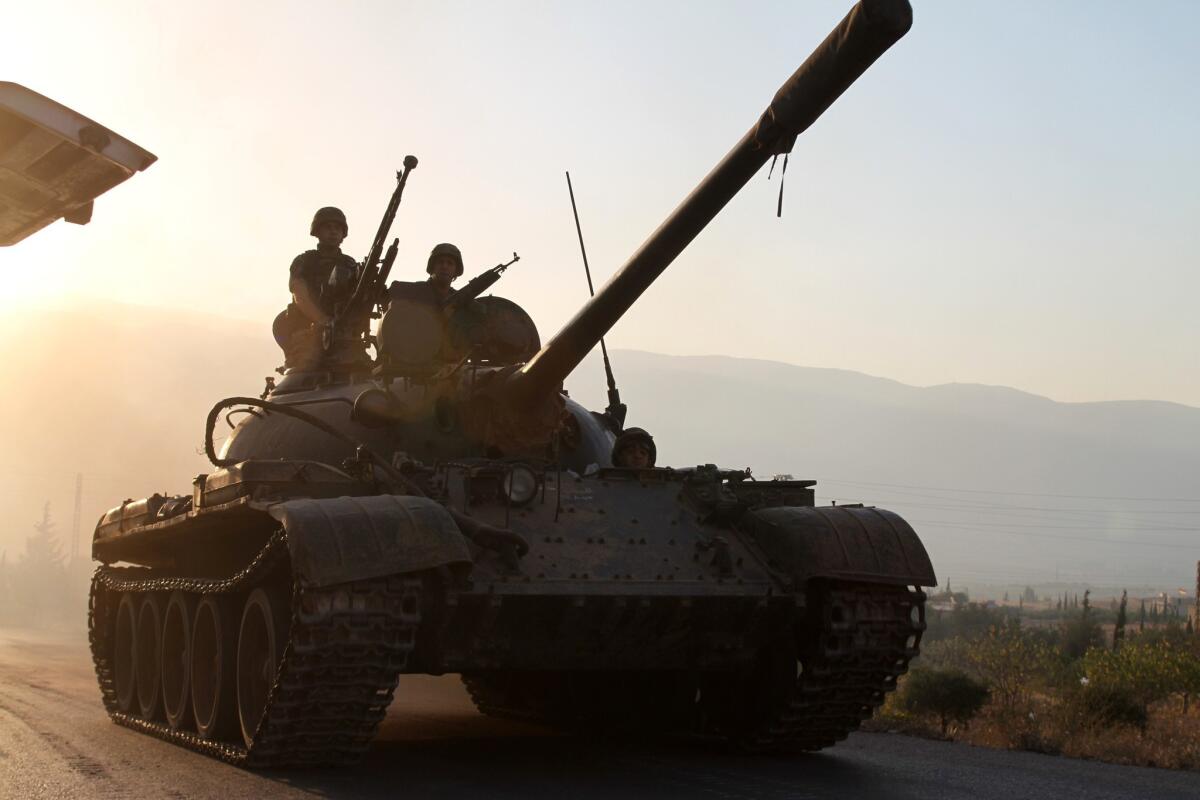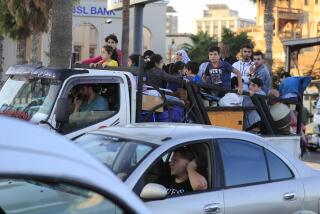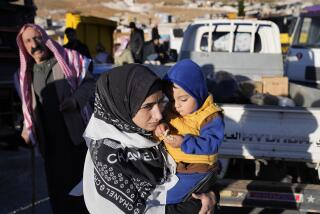Lebanese soldiers, civilians killed in Syria spillover violence

Reporting from Beirut — At least two Lebanese soldiers and several civilians were reported killed Saturday in clashes with Syrian rebels on Lebanese territory close to the Syrian border, according to press and official accounts.
The incident was the latest example of violence spilling over into Lebanon, where the Syrian conflict has heightened sectarian tensions.
After Saturday’s violence, Lebanese lawmakers pledged solidarity against “terrorism,” a declaration that has become routine in the wake of attacks related to the Syrian civil war.
Saturday’s clashes erupted after Lebanese army troops near the border town of Arsal arrested a Syrian rebel affiliated with Al Nusra Front, a Syrian opposition faction linked to Al Qaeda, according to Lebanese government accounts. The army identified the suspect as Imad Ahmad Joumaa, a Syrian national.
His detention prompted armed groups to attack army positions and demand the suspect’s release, according to Lebanon’s national news agency. Various reports described hours of gunfire and a tense standoff. Two army soldiers were captured but later freed, according to the army.
A group of gunmen “from different nationalities” opened fire on army headquarters and other sites in the Arsal area, resulting in severaldeaths and injuries to troops and civilians, an army statement said. Local media said two soldiers had been killed. The number of civilian casualties remained unclear.
Security was heightened in Arsal and elsewhere in response to the attacks, the government reported.
The violence erupted as pro-government forces in Syria mounted an offensive against Syrian rebel bases close to the Lebanese border, Syria’s official news service reported. That advance may have prompted fighters to seek refuge in Lebanon.
The Lebanese army said Saturday’s attacks in Lebanon were “planned and studied,” adding: “The army will not allow any side to move the battle from Syria to its lands.”
Arsal, where the population is mostly Sunni Muslim, has long been a rear-guard supply and logistics zone for the predominantly Sunni rebels fighting to oust the government of Syrian President Bashar Assad. It also is home to tens of thousands of Syrian refugees who are among the more than 1 million who have fled to Lebanon since the war broke out in 2011.
Arsal and environs have become centers of conflict between Syrian rebels and Lebanese security forces. In March, three Lebanese soldiers were killed in a suicide car bomb attack at an army checkpoint outside Arsal, the government reported.
Syria’s civil war has deeply divided Lebanon, often along sectarian lines.
Many Sunni Muslims in Lebanon back the uprising against Assad, who is a member of the minority Alawite sect, an offshoot of Shiite Islam. Lebanese Shiites tend to support Assad’s government, fearing the rise of Al Qaeda-style Sunni militants who view Shiites as infidels.
The Shiite group Hezbollah, a major political and military force in Lebanon, has sent militiamen to Syria to fight on Assad’s behalf. Some Sunni activists have accused the Lebanese army of collaborating with Hezbollah. Lebanese army commanders deny the charge, but its forces are widely believed to be less powerful than those of Hezbollah.
As the gun battles raged Saturday along the Syrian-Lebanese border, political leaders in Lebanon’s delicate governing structure lined up to back the armed forces.
“We need to put all political differences and calculations aside and collectively support the Lebanese army and security forces in the face of terrorist threats,” Lebanese President Michel Suleiman said in a statement.
Times staff writer McDonnell reported from Beirut and special correspondent Bulos reported from Buenos Aires.
More to Read
Sign up for Essential California
The most important California stories and recommendations in your inbox every morning.
You may occasionally receive promotional content from the Los Angeles Times.











